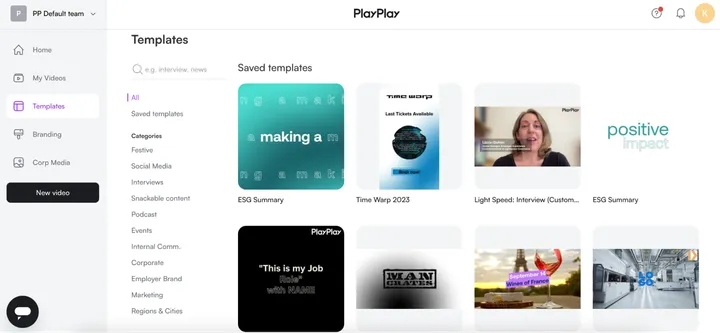Trust is one of the biggest factors that influence audiences today.
And with 94% of customers saying they’re more likely to trust brands that demonstrate transparency, it’s clear that this is a huge part of the decision-making process.
Video is the ideal way to connect with your audience on a deeper level, offering a visual medium that allows you to showcase authenticity, personality, and transparency like never before. Corporate videos especially are a great way to humanize your brand, providing behind-the-scenes glimpses into your company culture, introducing key team members, and sharing stories that resonate with your audience on a personal level.
But how much does it cost?
In this post, we’re going to dig down into what it really costs to create corporate videos for your business in 2024.
The Importance of Corporate Videos
Corporate videos are created by businesses or organizations for internal or external communication purposes, and they play a pivotal role in business, serving as powerful tools for communication, marketing, and branding. These videos can cover a wide range of content, including promotional videos, training videos, corporate culture showcases, and executive messages.
Some of the key uses of corporate videos include:
Increased brand awareness
Corporate videos are a great way to connect with your audience and enhance visibility and recognition. Through engaging visual storytelling, companies can effectively communicate their brand identity, mission, and unique selling propositions to their target audience. By showcasing their products or services in action, these videos can create a lasting impression on potential customers, building up brand loyalty and driving sales.
Check out Cascade’s “The First Time” brand video, using a bit of innuendo and tongue-in-cheek humor to highlight the benefit of their services.
Effective training and development
These videos also can be invaluable tools when it comes to internal communication and training within organizations. From onboarding new employees to providing ongoing training and development opportunities, videos offer a dynamic and interactive medium for conveying information. Whether it's explaining company policies, demonstrating new processes, or sharing insights from company leadership, corporate videos are great for effectively engaging employees and facilitating learning in a way that traditional methods can’t always achieve. Research has found that on average, e-learning increases a learner’s retention rate to 82%.
Metro Email Service has a great example of this, using video to bring common internet security issues to life and help guide their audience.
Enhanced communication and engagement
Corporate videos are perfect for internal communications as well, introducing a dynamic and interactive way to share information through different teams (especially for companies that have offices in more than one location). Whether it's explaining company policies, demonstrating new processes, or sharing insights from company leadership, they’re the ideal solution for getting information across quickly and efficiently.
Vyond’s Etiquette for Conference Calls video gives a nice animated example of how you can communicate messages effectively to your staff in a way that’s also a bit fun!
Improved employee satisfaction
They can also have a huge effect on employee satisfaction, helping to foster a sense of belonging, empowerment, and alignment with company goals. With engaging videos that highlight the company culture, values, and achievements, employees can gain a deeper understanding of their role within the organization – something that can have a huge effect on their overall happiness. They can also be used to recognize employee achievements, helping to boost morale and motivation.
Thought leadership positioning
Corporate videos are great for establishing thought leadership within your specific industry or niche. By producing insightful and informative video content that addresses industry trends, challenges, and best practices, companies position themselves as an authoritative voice, encouraging viewers to trust what they say. Content featuring interviews with industry experts, educational presentations, or case studies can be especially useful to showcase the company's expertise and innovative solutions, attracting the attention of potential customers, partners, and investors.
This recruitment video from Zendesk is a great example of how a company can show off their values and attributions, bringing them to life and encouraging people to join their ranks.
Trust building
Leading on from that, corporate videos are instrumental in building trust and credibility with stakeholders, including customers, investors, and partners. By providing behind-the-scenes glimpses into company operations, showcasing customer testimonials, or featuring interviews with key personnel, videos humanize the brand and establish a sense of transparency. This authenticity helps to foster stronger relationships with stakeholders and can ultimately contribute to long-term success and sustainability for the organization.
Wyzowl are great at promoting client testimonials, and this is a great example of how they use these to highlight the benefits of their services effectively and professionally.
Increased sales
Through persuasive product demonstrations, customer testimonials, and explainer videos, companies can effectively showcase the benefits and value propositions of their offerings. These videos not only educate prospects about the features and functionality of products or services, but also address their pain points and demonstrate how the company can address their needs. By integrating calls-to-action and tracking outcomes, companies can measure the impact of their video content on sales conversions, enabling them to refine their strategies and optimize their return on investment.
Take a look at this explainer video from SalesMath, taking all the complexity out of their product and making it nice and simple for viewers to understand.
Competitive edge
Online content is everywhere these days, which means if your company isn’t producing it, you can quickly get left behind. In fact, 66% of consumers have actively searched for video content to find out more about a brand. Corporate videos are vital for giving you a more competitive edge when it comes to reaching and engaging audiences. With a wide range of social media platforms, streaming services, and video-sharing websites to choose from, companies have plenty of channels to distribute their video content on, connecting with their target demographic.
We love this example on TikTok from Salesforce. While TikTok might not be considered their usual platform, they’re embracing the simple, fun nature of the platform and using it to create unique content that engages with a completely new audience.
7 Factors Influencing Corporate Video Costs
When it comes to budgeting for your own corporate videos, there are a number of different factors that can influence the cost. This includes:
1. Project scope
The scope of a corporate video project plays a significant role in determining its overall cost. A detailed project scope outlines the specific objectives, requirements, and deliverables of the video, including its length, style, content, and target audience. More extensive project scopes, such as videos requiring multiple locations, actors, complex animations, or extensive post-production editing will typically incur higher costs due to the increased time, resources, and expertise required to execute them.
For example, if you want to show users interacting with your new software, you might need to rent a space to imitate an office, as well as hiring an actor who will demonstrate the benefits of our new features.
2. Video length and complexity
The length and complexity of the video significantly impact production costs. Longer videos with intricate animations, special effects, or advanced editing techniques require more time, resources, and expertise, which will usually lead to higher costs.
For example, there could be a huge difference in price between a 30-second how-to video or a more in-depth, complex explainer video.
3. Production quality
The level of production quality desired, including the use of professional cameras, lighting equipment, and audio recording gear, can also influence costs. Using high-definition filming and professional-grade editing will usually add a fair bit onto the final fee.
For example, if your video is for internal purposes only, you may find you only need a simple video recorded on an iPhone, but if your video is being promoted on social media or anywhere else public, high-quality production may be required to reach the right audiences and leave a lasting impression.
4. Location and filming equipment
Where you choose to film your video can also have an effect. If you need to rent a space, or secure permits for specific locations, there will likely be costs associated with this. Additionally, renting or purchasing filming equipment, such as cameras, lenses, drones, and stabilizers, as well as lighting and audio equipment will add to your bottom line.
For example, if you want to include drone footage of your office in your promotional video, you’ll need to hire an expert who can achieve these shots for you.
5. Agency reputation
The agency that you choose to work with will also be a factor worth considering. Established agencies with a proven history of delivering high-quality work and satisfying clients may command higher rates for their services. Hiring a less experienced or untested agency may come with lower upfront costs but could entail risks such as subpar quality, missed deadlines, or communication challenges.
For example, you may choose to work with an agency that has specific expertise in your industry, with a proven track record that makes you feel more confident in working with them.
6. Editing and post-production
Post-production editing can be a complex process, taking into account things like color correction, audio mixing, visual effects, and motion graphics. Skilled editors and specialized software are usually necessary to achieve professional-looking videos, which may incur additional expenses.
For example, a tech company producing an instructional video for a new software application may require post-production editing to overlay text annotations, highlight key features, and incorporate animations to enhance the clarity and engagement of the tutorial.
The good news? AI-powered editing tools like PlayPlay make it simpler than ever for marketing & comms teams to produce post-production video editing in-house. Packed with customizable templates and full suite of drag and drop editing features, teams can achieve studio-quality editing results in minutes – no experience required. Try for free now.
7. Additional services
Beyond the production of the corporate video itself, additional services such as marketing, distribution, and ongoing support can contribute to overall project costs. These services are often considered essential for maximizing the reach, impact, and effectiveness of the video in achieving its intended goals.
For instance, if your company is launching a new product, you may require marketing services to develop a targeted advertising campaign, distribute the video across various online platforms, and provide ongoing analytics and optimization to ensure the video reaches its target audience and drives desired outcomes.
If you decide to hire external help, it could get pricey and take up a lot of time. That's why it might be worth considering creating content through your internal team.
Saving Time and Money with In-House Video Production
As the demand for captivating video content grows, it’s no wonder that more and more businesses want to get involved. While outsourcing video production may seem like the go-to option, harnessing the power of in-house capabilities can offer unparalleled advantages. Here's why:
1. Cost savings
As we pointed out above, creating videos through an agency can be an expensive task. By bringing this in-house, you can avoid these hefty fees and use that budget more effectively towards other sales and marketing initiatives.
2. Control and flexibility
In-house production provides full control over the creative process, ensuring that the final product aligns seamlessly with the company's vision and objectives. Additionally, it offers the flexibility to adapt quickly to changes and feedback, without being dependent on external vendors.
3. Faster turnaround
When you use your own internal teams, it’s likely that you’ll have resources more readily available to you. Without the need for sign-off on huge budgets, going through a range of different decision makers, projects can be completed with much greater efficiency, leading to faster turnarounds times. This means that the time taken from having an idea to getting your video to market can be cut dramatically!
4. In-depth market knowledge
There’s no doubt that your own team knows more about your business than anyone that you could bring in. They have a deep understanding of your target audience, industry trends and brand identity, meaning they can create content that resonates authentically with your viewers.
5. Branding consistency
Similarly, your team also knows your brand inside out. This means there will likely be greater consistency with branding elements, messaging and visual style across all the video content you create. This helps to reinforce your brand identity and strengthen the brand recognition.
6. Enhanced team collaboration
Building out video content is something that should involve more than just your marketing team. It’s actually a great opportunity to collaborate across different areas of the business, such as sales and communications, bringing everyone together to create something cohesive and impactful.
7. Ownership of intellectual property
By keeping video production in-house, your company can retain full ownership of your intellectual property, safeguarding valuable assets and ensuring long-term control over content distribution and usage rights.

Interested in taking your in-house videos to the next level ?
Create Your First Corporate In-House Video
We know what you might be thinking. It’s all very well telling you to bring your video content creation in-house, but what if you don’t have any experience in actually making videos? You’re not alone – a study by Statista found that 43% cited a lack of in-house skill (filming, editing, etc.) as a reason they don’t create video in-house.
But don’t worry. We have just the solution for you.
We designed PlayPlay’s leading video creation solution with people like you in mind, giving you all the tools you need to create professional and engaging videos in a matter of minutes – with no editing skills required.
All you need is some raw footage from your smartphone and the PlayPlay platform.
Here’s how to do it.
Log into your PlayPlay account and upload all of your video footage.
Note: We accept loads of video formats, including MP4, MOV, MKV and MPG.
Step 2 – Choose your corporate video template
Next you can either choose from our range of pre-made, fully customizable video templates, or select ‘new video’ to build your own from scratch.
Step 3 – Edit your video
This is where things get exciting – it’s time to edit your video! With PlayPlay, you can add logos, text, voice-overs, royalty-free media and music, and transitions with just a few clicks. This is where your video gets its personality, ensuring that it’s not only in line with your brand guidelines and vision, but also engaging and exciting for the viewer. Get creative and have fun with it!
Note: We have a handy feature that allows you to lock your logos, fonts, colors, intros and outros to make sure that all the content you create is consistent.
Step 4 – Download and share your corporate video
Once you’re happy with the look and feel of your video, make sure to send it to your team for their feedback. And when you’re done, it’s time to get it out there!
Preview, download and share your corporate videos wherever you want – including your social media, website and sales channels.
It really is that easy!
Are you ready to have a go? Get started today with PlayPlay’s free trial.
Melissa Francois
Head of Global Content & Comms
With over 10 years of experience in the wild world of SaaS, Melissa cares about building great brand stories and driving community engagement through engaging content. Off the clock, she enjoys long walks and a pint in a cozy country pub.





